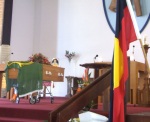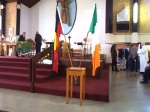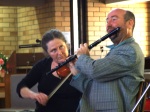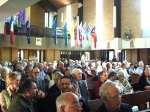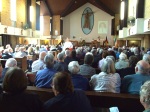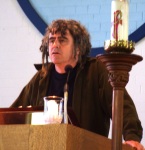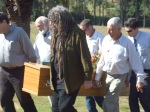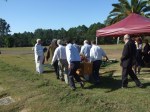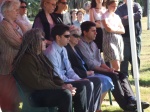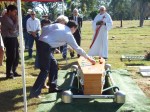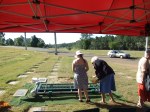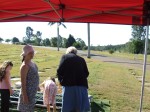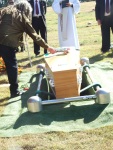Video footage from the memorial service can be accessed by going to
http://www.vimeo.com/6439270
On Friday August 21st. approximately 300 people gathered at Holy Cross Church Wooloowin, Brisbane, for the funeral of Garrett O’Reilly. Garrett had died in the early hours of Tuesday morning August 18th. The coffin was draped in an old rebel flag of Ireland (green background with a gold harp), the Tricolour and Aboriginal flag were also placed on the altar. Airs and laments were performed during the viewing, preceeding the mass, by Simon Wells (tin whistle, flute) and Helen Rowe (fiddle). Simon and Helen also joined Patricia Kelly in performing the opening hymn “Amazing Grace”.
Abroriginal elder, activist and playwrite Sam Watson commenced proceedings with a “Welcome to Country” and spoke of the grief around Garret’s death.
Brendan O’Reilly read a reflection by Patrica Murphy Butler. The responsorial psalm was “The Lord is My Shepherd”, the Gospel reading Matthew 5: 1-10. Ciaron O’Reilly read a poem by Fr. Daniel Berrigan SJ “To the Jesuits of Central America – The Gratitude of a Brother”. Patricia Kelly performed “Di Alosa” in Irish and “Be Not Afraid” as the Communion hymn. Mark Dalton performed “Kevin Barry” following communion and Patricia Kelly sang “Danny Boy” as the coffin was carried shoulder height from the church.
The offertory gifts included Garret’s harmonica and an Offaly GAA top carried by granddaughters Esther and Ruby O’Reilly. Also offering traditional East Timorese sashes was Afonso Corte Real who met Garrett shortly after fleeing the 1975 Indonesian military invasion of his country. Afonso and Garrett had initially met around solidarity work for East Timor during the early years of the invasion.
An initial reception was held at the church before family and friends accompanied the coffin for burial at Pinaroo Cemetery.
A Celeberation of Garret’s Life continued at the home of Lisa Bridle, Terry Fisher and family into the evening, with music provided by Mark Dalton and Simon Wells.
There were three eulogies given during the mass by Sean Curley, Ciaron O’Reilly and Sean O’Reilly. The full texts below………..
EULOGY BY SEAN CURLEY
(Sean Curley was born and raised in Athlone in Co. Offaly Ireland. He did an apprenticeship in Clara, Co. Offaly before migrating to Australia in the mid-70’s)
When I received the news last Tuesday (18 August 2009) that Garrett had died, my initial response was one of relief that Garrett’s last struggle was over.
However as time passed, strong emotions took over. They cut deeply and opened me up – triggering memories of a 32 year long friendship. As I went through this, I recalled reading an article by Joseph Campbell in which he discussed evidence of the early signs of the evolution of human consciousness. Campbell argued that if we study the way our ancient ancestors cared for the remains of their dead we see eveidence of the evolution of our consciousness in this act. He invites us to imagine what it was like sitting around a campfire with one member who is poorly or sick. When morning breaks that one is dead. He argues that in the rituals and act of burial we have evolved a physical manifestation of our emotions. We choose to stay and not walk on. We stop to show our respect. We may not even had the language to wrap around and express our emotions.
I believe the strong emotions experienced are the personal price paid for one’s connectedness and regard for another.
So today, we continue this ritual as we come together to express our respect and regard for Garrett.
Over the past 32 years, Garrett has shared many stories with me. We came from the same region in Ireland and as I had worked in his home town of Clara, I was able to complete some of the stories Garrett had heard as a 17 year old and at times add a fresh dimension. Sometimes there was dispelling of some of the local myths by correcting some historical and personal facts – not always to Garrett’s satisfaction.
We were both migrants, I, however, chose to leave Ireland. Garrett and many of his generation had no such luxury. For many of them, and in particular, Garrett, at age 17 that rupture from family and community connection left its mark. The physical disconnect was repeatedly experienced in the quiet of the night in a foreign land.
As a parent, I have reflected on what it would be like to experience the parting of one of my 3 children. To see them go to one of the “outer planets” and as a parent experiencing the reality that you may never see or hear from them again is difficult to contemplate. Such was the lot of many early Irish migrants and those left behind.
Garrett spoke with reverence about both of his parents and of the values and principles they instilled in him.
MEETING GARRETT
In 1977 a group of us set up a “Troops Out” Committee, an organisation that grew out of the UK trade union movement calling for the withdrawl of troops from Northern Ireland. We were invited by Ciaron O’Reilly to a meeting in a church house not far from where we are today. Prior to the meeting, Paul, one of our committee members, expressed unease about meeting this Mr. O’Reilly. He had heard he was a “big shot executive” who worked with the Chrysler Corporation and drove a big flash car. Also he thought it was quite possible that Garrett was a Special Branch or ASIO spy.
At the meeting I sat by a window looking out onto the driveway when this old light green Kingswood drove in and out got this burly man with a mop of curly grey-black hair. He was resplendent in his postman’s uniform, complete with long navy walking socks. When he introduced himself there was a joint sense of relief among the committee members. After the meeting I told Garrett of Paul’s concerns and he laughed and laughed and he said “No, no you’ve got the wrong person there”.
Over time, my relationship with Garrett has had 3 distinct phases – the sharing of homeland and migrant stories, our political and union activism and in later years our personal and philosophical evolution.
I recall one meeting when Garrett asked if I believed in God. He was shocked when I said no, I did not.
At our next meeting, I explained my position a bit better I think. I argued that God is a human construct and that many cultures have their own version of the God that we grew up with in our peculiar version of Irish Catholicism.
We discussed his personal battles which he faced up to with determination and integrity. Those experiences shaped him and helped him to understand what Manning Clark meant when he spoke about having compassion for those with “cracks in their clay”.
Garrett is part of my life and his life is part of the architecture of my children’s lives.
This time next week, I will be in Ireland and over the weekend I will visit Garrett’s hometown of Clara and call on his family. I will take with me a sprig of wattle that lies on Garrett’s coffin and place it on his parent’s grave and I will tell them this:
“Your son Garrett, in the final days of his life was surrounded by a loving family and friends.
He was a proud husband, father and grandfather. He told me the happiest days of his life were when he was with his sons, taking them to soccer, tennis and swimming at the Spring Hill Baths.
He told me how important it was for kids to be able to talk to their parents about any worries no matter how big or small, that no matter what, you would always stand by your children.
He has been honoured by the local aboriginal community, members of the oldest continous culture on this earth.
He was a long time member of the Australian Labor Party. He was a commited Trade Unionist, a respected workplace delegate who never took a backward step in advocating for rights and reforms of his fellow workers. In the tradition of the great Irish socialists, James Connoly and Jim Larkin, he did not romanticise or see any virtue in being poor but worked to address the structural issues in society that impoverished.
He marched in the streets of Brisbane to support aboriginal people’s rights of self-determination. He supported the rights of gay and lesbian people.
He marched for civil liberties and against the oppression and corruption of the Petersen National Party Government.
He marched for peace and the end of British rule in Northern Ireland.
Your son Garrett who left home at 17 and who eventually made a new home in Brisbane was an honoured and respected member of our community. He faced up to life’s challenges and did the best he could.
My last memory of Garrett was when his son Sean and I helped him sit up in bed to drink water. Father Peter Kennedy and Father Terry Fitzpatrick from St. Mary’s community entered the room. Garrett’s face lit up and the transparent joy and comfort he experienced in their presence will be etched in my consciousness forever. I recall as a teenager resolving that heaven and hell was a state of mind in which we die. Your son is in heaven.
I mourn your son’s passing and I will miss him.”
Sean Curley
EULOGY BY CIARON O’REILLY
Many thanx for gathering today in memory of dad and in solidarity with us – his family.
I was hoping Gary MacLennan would be here to give a eulogy – but Gary is in court today defending the disabled from the attacks of the bureaucrats and nihilists of QUT. It’s always good to have someone from the tribe absent when we gather, in court or jail, taking it to the man – and it’s Gary MacLennan’s turn today!
So many good folks have sent messages of sympathy and solidarity from around Australia, Ireland, England, Scotland, New Zealand and the United States.
Dad made friends whereever he went. Some of our earliest memories are of Dad initiating introductions, striking up conversations on public transport, football games and in just about any queue that was forming. Dad incarnated that Filipino saying, “There’s no such thing as strangers, only friends we haven’t met!”
Dad was born in 1928 in the small village of Kilbeggan, County Westmeath, Ireland and grew up a few miles from there in the village of Clara, County Offaly. Although he was the eldest of 13, he was raised by his maternal grandparents in a houseful of Aunts not too much older than himself. The affirmation received as the golden boy in a house full of women did no harm to his self esteem. Being raised away from his siblings, however, did sew a sense of rejection later compounded by his expulsion from the Clara school and the long daily cycle to the school back in Kilbeggan. In later years he was able to name and deal with such feelings of rejection, exorcising them somewhat from his subconscious. His grandparents gave him a strong diet of Irish Republicanism, the socialism of James Connoly and the Irish language – Dad remained a fluent Irish speaker.
Some of our earliest memories are of Dad telling us bed time stories of Kilbeggan and Clara of Mother Rhina Roo, of neighbors who took in mythological proportions. Dad promised to take us back to this Promised Land one day. Dad left his village in 1945 and was not able to return for 30 years.
Dad left his home for London at 17 and then on the boat to Australia when he was 21. He loved the life, the travel, the song, the craic and could handle himself if called on to defend the good name of Mother Ireland in the bars of London or the pubs of Australia.
I once asked Dad how he got his broken nose? He replied, “I was talkin’ when I should have been listenin’ ”
I was never quite sure of that answer was an implied gentle threat to the nature of the question posed or what – but it turned out to be good advice. Whenever I’ve been bashed or batoned over the years it’s usually been when I was talking when I should have been listening.
Dad was an intensely spiritual man – I don’t think he understood consumerism or how to behave in a consumer culture. It was always people, family, community, song, story telling, the craic that was his passion.
He even had quite a mystical approach to smuggling! In the early 1980’s, we were waiting at Brisbane Airport for Dad to return from a trip to Ireland. Waiting, as you do, for Dad to clear customs and for the large automatic doors to open and deliver our Celtic patriarch. The doors open and out strides Dad with a bottle of poitin in either hand – for the uninitiated, poitin is a potent illegal Irish moonshine whiskey – Dad had marked the bottles “Lourdes Holy Water”. The brazen genius of this amazed me. I asked him, “What if customs checked it?” He replied “I’d claim it was a miracle!”
Many folks from all sorts of backgrounds resonated with Dad’s thirst for justice and integrity – he was sound, solid, reliable and would take no shite from power or privilege. He spoke truth to power at work, in church on the streets.
An early memory is the “Holy Name Society” pledge of which all the boys and men of the parish would be obligated to stand and recite on a monthly basis during Sunday mass. The President of the Holy Name Society also happened to be the head of the Special Branch seving the corrupt and authoritarian Queensland state government. When it came to repeating the line of the Holy Name oath “We pledge obedience to all lawful and civil authority”, the O’Reilly pew would collectively fall silent for that part.
I remember the first time a police car was parked outside of our house to make enquiries regarding the O’Reilly brothers during the “Right to March” period of the ’70’s. Dad’s worry wasn’t that the people in the street might think we were criminals. His concern was that they might mistake us for police informers. That told me a lot!
Like Dad, we were raised on rebel songs and stories. When I was 11 – 27 unarmed Catholic civil rights marchers were shot down and 13 killed by British troops in Derry. Dad dragged me along to my first protest following this Bloody Sunday. A fact I would remind him of over the years when he visited me in custody, phoned me in jails in Australia, the U.S. or Ireland or advised me to take my foot off the peddle in confronting state power.
He valued his Irish Republican mates in Brisbane and they valued him. They were there with him last weekend in his last hours of consciousness.
I guess for me Irish Republicanism was my Old Testament – with the Berrigans and Dorothy Day providing a New Testament fulfilment of its best promises. It was great, for me, when Mum and Dad on the way back from Ireland in ’94 did a U.S. circuit staying with the Berrigans and many of the Catholic Workers I had lived with before my imprisonment and deportation from the U.S.. For me it felt like a full circle.
Dad was a very social man but a dedicated family man. The transition from his roving days of his 20’s to the demands and responsibilities of married life were nearly to much for him. Dad had a breakdown just after Sean was born. Mum and Dad broke through that together, Dad gave up drink and always had a deep compassion and solidairity with folks living with mental and emotional fragility. He was active for years in Grow.
Going “straight edge”, as the punks would call it, didn’t slow down Dad’s love for ceilhis, music sessions and gatherings. It has been a gift to his sons later in life that Dad could speak so freely of his fragility, vulnerability and failures. It reminds me of the Leonard Cohen lyric, “Abandon your perfect offering, everything has a crack in it, That’s how the light gets in!”
Dad would go into troughs of negativity, usually around the betrayals of the institutions he had put so much faith in….
-the Church
-the Labor Party
-the Irish leadership.
I would tell him that all these elites had bought Satan’s three desert temptations – power, wealth and status – things he didn’t desire. My father had no interest in power, wealth or status. On one occasion when Dad was moaning the latest sell out and the lack of solidarity – Gary MacLennan responded “If you want loyalty, buy a dog!” I thought that was succint advice if a little pessimistic.
It was a privilege to spend the early hours of last Sunday morning alone with my Dad as he was suffering and dying, lying naked he had pulled off the sheets and his clothing, we held hands, squeezing, winking and nodding at each other through the long night. Sometimes we’re up against such powers of death, institutions, war – that all we can do is hold hands, wink and nod at each other.
Dad spent over 80 years teaching his sons how to live well.
He spent the past week showing us how to die well.
Eternal light grant unto him O Lord
Ciaron O’Reilly
EULOGY BY SEAN O’REILLY
In speaking of our father, Garrett O’Reilly, I just want to mention a few aspects of his life that have special resonance for me.
My father left Ireland in 1945, two months short of his 18th birthday and wasn’t to return for 30 years. In 1949 he travelled from England to Australia at 21 years of age. I headed in the other direction at the same age. It was the cheap passage and sense of adventure that brought him here and he traversed much of Australia and New Zealand over the following 5-6 years before meeting our mother, Mary, and marrying in 1957. He told us of his experiences. Boarding houses, dancing halls, moving often from one job to the next and long train journeys. Stowing away on a ship back from New Zealand and wilder times when he experienced the hospitality of a few police watchhouses. I took that sense of adventure with me as I have travelled Australia and overseas.
As young boys we listened to stories of Dad’s growing up in Ireland- school, dances at the crossroads, chasing rabbits and digging peat- to name a few. Ireland took on a somewhat mystical and special place that we would one day travel to on a ship. He would sing, speak Irish, play the harmonica and tell stories on request or more often quite spontaneously without waiting to be asked. So far from his country of birth but Ireland still very much in his heart. Some may say a romantic. Growing up attending the Harp and Shamrock Club functions and later the Troops Out of Ireland protests, I was fortunate to be as emersed in the Irish culture as I could be and surrounded by Irish families which I still hold dear. The door was always open and many newly arrived Irish and other folks passed through, my mother the backbone of our hospitality. When I walked up the hill of Aughamore, outside Clara, Co. Offaly and into my grandparents home on that grey August day in 1979, there was immediately something so familiar and a sense of belonging to that place. It may be because his own father was directly involved after 1916 but Dad always had a strong sense of justice.
I don’t remember ever thinking the system was fair for everyone. Some were missing out through no fault of their own and I owe that awareness to my father. Early on when he worked in the post office there was an industrial action. He was only temporary at the time and risked losing his own position to stand with his workmates. He was shattered by the dismissal of the Whitlam government in 1975, joined the A.L.P. and became actively involved. He was later equally shattered by the Hawke Labour government’s decision to approve uranium mining and its betrayal of the East Timorese people that he moved away from the A.L.P. in search of groups with greater integrity. Dad was a member of the East Timor solidarity group, supported the rights of indigenous Australians and later became a union rep. in the mailroom, relishing the role. There would be a smile on his face, recounting exchanges with management as he stood up for his fellow workers. On another occasion he took Kim Beazley to task when presented with the opportunity at a Labour Day march. Dad was concerned about our welfare, whether involved in protests or in custody but above it all he was immensely proud of the stands his sons have made over the years.
For some time now Dad had felt his quality of life was declining. The final 67 days of my father’s life was spent in hospital. He appreciated the love and support of family and friends and wanted so much to get home. For a time that seemed possible and he struggled to achieve it. But over the past few weeks the health problems kept mounting. Dad became aware that his life was slipping away and he accepted this. Late last week my father’s condition became a whole lot worse and on Saturday night he said that he was ready to leave this earthly life. I reminded him of what a wonderful father he had been and how much we owe him for the people we have become. I am grateful to God that my father could die with the same dignity with which he had lived.
Sean O’Reilly
